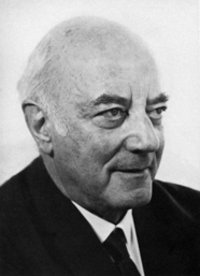Edgar Salin (1892–1974)
Edgar Salin grew up in Frankfurt am Main, stemming from Jewish family of manufacturers and bankers. He completed his studies in Heidelberg under Alfred Weber, the younger brother of Max Weber, with a doctoral degree. Salin, much like his doctoral advisor, advocated for a broad, integrative understanding of economics that encompassed not only economic science but also cultural and social sciences, as well as philosophical traditions. It is no coincidence that his habilitation thesis, completed in 1920, dealt with Plato’s utopian thought.
In 1924, Salin was appointed to a professorship at the University of Heidelberg’s Institute for Social and State Sciences. Even during his time in Heidelberg, he championed a close connection between economics and social sciences – an understanding of political economy in the broadest sense. He was the supervisor, for instance, for the doctoral project of a young American student, Talcott Parsons, who wrote his dissertation at Salin’s suggestion on the concept of capitalism in the works of Marx, Sombart, and (Max) Weber, later becoming one of the most significant American sociologists of the twentieth century.
During his time in Basel, Salin continued to advocate for a broad, interdisciplinary approach to economics. Although he clearly favored qualitative approaches, he did not fundamentally oppose the trend toward mathematization and formalization that had taken hold of economics since the interwar period. He worked closely with Gottfried Bombach, who was appointed to Basel in 1957 as a mathematically oriented economist. What Salin resisted was the disciplinary segregation into isolated subfields that he observed in contemporary economics elsewhere. In his view, economics needed to reflect the social and cultural contexts in which economic activity was embedded.
In this sense, Edgar Salin’s understanding of economics and economic activity was part of a holistic social scientific perspective. To further this cause, in 1947 Salin founded the journal Kyklos: Internationale Zeitschrift für Sozialwissenschaften (Kyklos: international review for social sciences), which still exists today. It aimed to foster an interdisciplinary discourse on fundamental questions of economics beyond mathematizing approaches.
It goes without saying that Salin strongly supported the close connection between sociology and economics that had been established at the University of Basel since the appointments of Julius Landmann and Robert Michels. Yet he also criticized sociology for the tendency to position itself too strongly as an autonomous discipline, thereby neglecting interdisciplinary ties to other subjects. Salin accordingly resisted efforts in Basel to establish sociology as a separate subject. Hence the first chair at the University of Basel dedicated solely to sociology, established in 1960 at Salin’s behest, was affiliated not with a Department of Sociology but with the new Institute for Social Sciences.
In his role at the University of Basel, Salin also made a name for himself with statements on issues of current economic policy, positioning himself as a sharp critic of neoclassical approaches, and later, particularly of ordoliberalism, the dominant economic school in the young Federal Republic of Germany. Unlike market-liberal approaches, Salin emphasized the necessity of extensive state interventions in the economy. Accordingly, during the Great Depression of the 1930s he supported the expansion of collective labor agreements and of labor law, and even developed a state economic stimulus program known as the Arbeitsrappen, or “work penny,” which proposed a one percent income levy to finance public job creation measures and was in fact implemented in Basel.
Salin and the George Circle
Edgar Salin’s holistic understanding of economics owes much to his connection with the heritage of the historical school, as well as his membership in the George Circle, an elitist, male-dominated literary group that the poet Stefan George gathered around himself in Heidelberg from the 1890s until his death in 1933. The notion of aesthetics cultivated within this circle exhibits similarly holistic characteristics to Salin’s scientific understanding. Although Salin remained connected to the George Circle only until the early 1920s, before his time in Basel, and later distanced himself because of personal differences with George and George’s critical stance toward science, he was profoundly influenced by its aestheticizing intellectual environment. Salin was not the only Basel economist with ties to the George Circle. Julius Landmann, Salin's predecessor at the Basel chair, along with his wife Edith, also belonged to the intellectual community surrounding George.
The George Circle, which also included the philosopher Herman Schmalenbach, another Basel professor, exemplifies the close social and cultural connections between Basel and Heidelberg in the first half of the twentieth century. This regional network was further strengthened by the circle around Max Weber, which included several future Basel professors, such as Robert Michels and Karl Jaspers.
The founding of the Friedrich List Society
Besides his academic work, Salin advocated for a stronger interconnection between science, economy, politics, and administration as early as the 1930s. He was a driving force behind the founding of the Friedrich List Society in 1925, dedicated to the memory of the liberal economist Friedrich List (1789–1846) – a precursor of the historical school. The society organized a complete edition of List’s works and held numerous conferences and meetings on current economic and social policy issues, with participation from figures in academia, politics, and business. The List Society also commissioned numerous scientific reports on political questions. Deeply rooted in Germany, the society disbanded in 1935 for political reasons after the National Socialist seizure of power, only to reconstitute itself as the List Society in 1954 and resume its original program.



